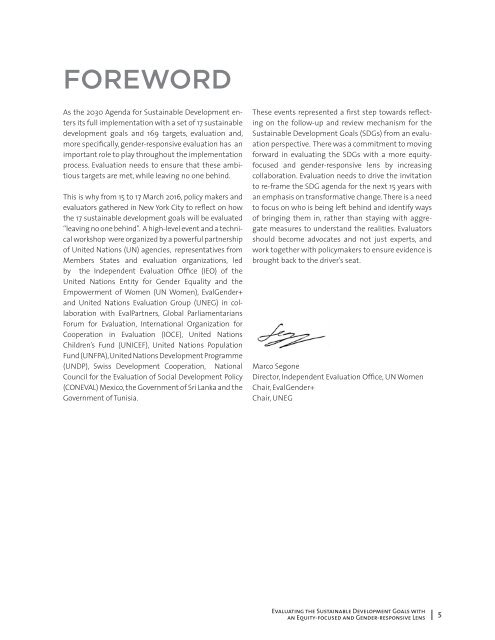NO ONE LEFT BEHIND
NY-Events-Report_WEB
NY-Events-Report_WEB
You also want an ePaper? Increase the reach of your titles
YUMPU automatically turns print PDFs into web optimized ePapers that Google loves.
FOREWORD<br />
As the 2030 Agenda for Sustainable Development enters<br />
its full implementation with a set of 17 sustainable<br />
development goals and 169 targets, evaluation and,<br />
more specifically, gender-responsive evaluation has an<br />
important role to play throughout the implementation<br />
process. Evaluation needs to ensure that these ambitious<br />
targets are met, while leaving no one behind.<br />
This is why from 15 to 17 March 2016, policy makers and<br />
evaluators gathered in New York City to reflect on how<br />
the 17 sustainable development goals will be evaluated<br />
“leaving no one behind”. A high-level event and a technical<br />
workshop were organized by a powerful partnership<br />
of United Nations (UN) agencies, representatives from<br />
Members States and evaluation organizations, led<br />
by the Independent Evaluation Office (IEO) of the<br />
United Nations Entity for Gender Equality and the<br />
Empowerment of Women (UN Women), EvalGender+<br />
and United Nations Evaluation Group (UNEG) in collaboration<br />
with EvalPartners, Global Parliamentarians<br />
Forum for Evaluation, International Organization for<br />
Cooperation in Evaluation (IOCE), United Nations<br />
Children’s Fund (UNICEF), United Nations Population<br />
Fund (UNFPA), United Nations Development Programme<br />
(UNDP), Swiss Development Cooperation, National<br />
Council for the Evaluation of Social Development Policy<br />
(C<strong>ONE</strong>VAL) Mexico, the Government of Sri Lanka and the<br />
Government of Tunisia.<br />
These events represented a first step towards reflecting<br />
on the follow-up and review mechanism for the<br />
Sustainable Development Goals (SDGs) from an evaluation<br />
perspective. There was a commitment to moving<br />
forward in evaluating the SDGs with a more equityfocused<br />
and gender-responsive lens by increasing<br />
collaboration. Evaluation needs to drive the invitation<br />
to re-frame the SDG agenda for the next 15 years with<br />
an emphasis on transformative change. There is a need<br />
to focus on who is being left behind and identify ways<br />
of bringing them in, rather than staying with aggregate<br />
measures to understand the realities. Evaluators<br />
should become advocates and not just experts, and<br />
work together with policymakers to ensure evidence is<br />
brought back to the driver’s seat.<br />
Marco Segone<br />
Director, Independent Evaluation Office, UN Women<br />
Chair, EvalGender+<br />
Chair, UNEG<br />
Evaluating the Sustainable Development Goals with<br />
an Equity-focused and Gender-responsive Lens 5


